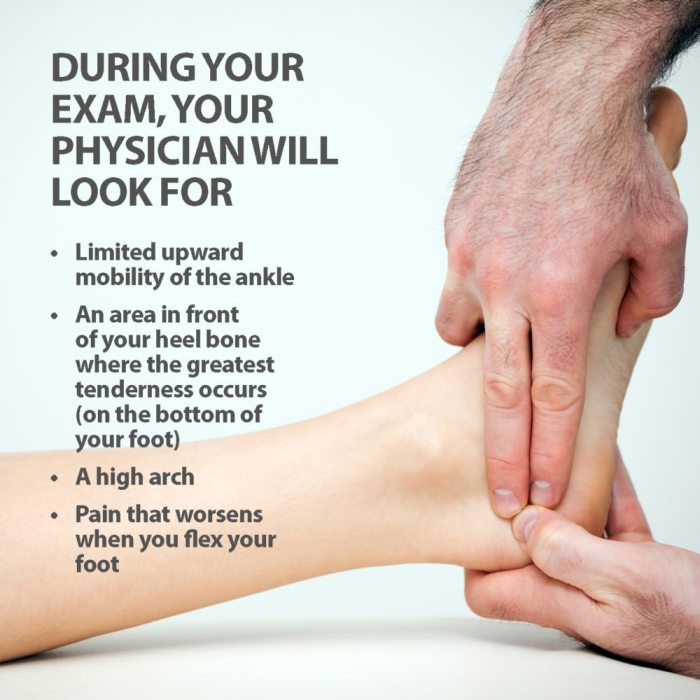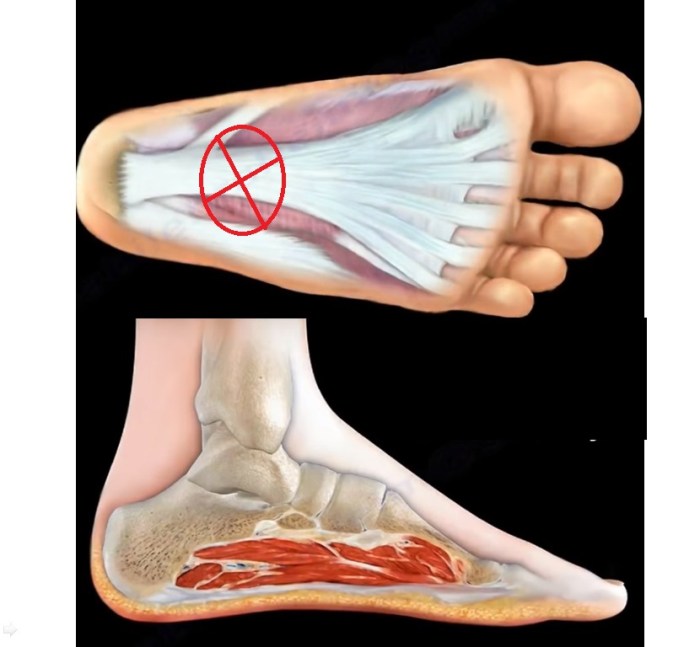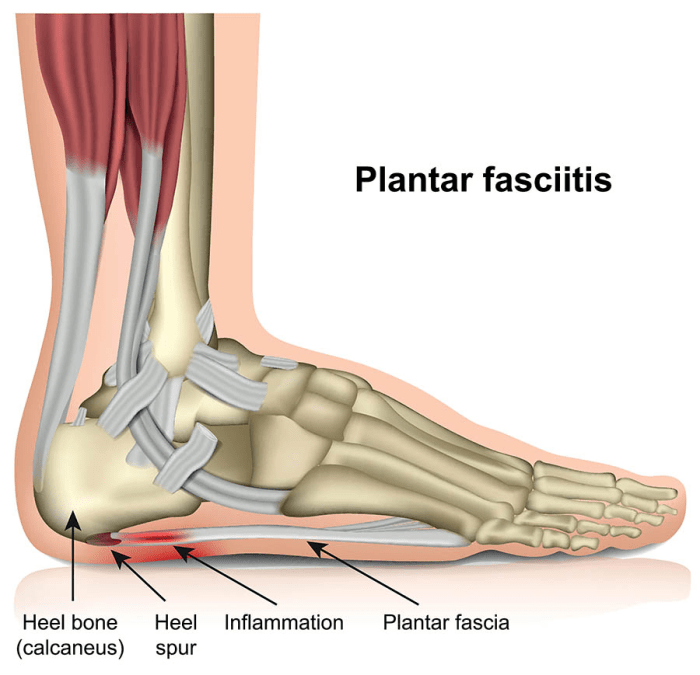Do i have plantar fasciitis quiz – Welcome to the Plantar Fasciitis Quiz! Plantar fasciitis is a common foot condition that causes pain in the heel and arch. If you’re experiencing these symptoms, take this quiz to assess your risk and determine if you may have plantar fasciitis.
Overview of Plantar Fasciitis: Do I Have Plantar Fasciitis Quiz

Plantar fasciitis is a common condition that causes pain in the heel and arch of the foot. It is caused by inflammation of the plantar fascia, a thick band of tissue that runs along the bottom of the foot from the heel to the toes.
The most common symptom of plantar fasciitis is pain in the heel that is worse in the morning or after a period of rest. The pain may also be worse after exercise or standing for long periods of time. Other symptoms may include:
- Stiffness in the heel
- Tenderness to the touch on the bottom of the heel
- Pain that radiates up the arch of the foot
Causes and Risk Factors
Plantar fasciitis is caused by overuse of the plantar fascia. This can happen due to a number of factors, including:
- High-impact activities:Activities that put a lot of stress on the feet, such as running, jumping, and playing sports, can all increase the risk of developing plantar fasciitis.
- Obesity:Being overweight or obese can put extra stress on the plantar fascia.
- Improper footwear:Wearing shoes that do not provide adequate support or cushioning can also increase the risk of plantar fasciitis.
- Flat feet or high arches:People with flat feet or high arches may be more likely to develop plantar fasciitis because these conditions can put extra stress on the plantar fascia.
- Age:Plantar fasciitis is most common in people between the ages of 40 and 60.
Do I Have Plantar Fasciitis Quiz

Plantar fasciitis is a common foot condition that causes pain in the heel and arch of the foot. It is caused by inflammation of the plantar fascia, a thick band of tissue that runs along the bottom of the foot from the heel to the toes.
Plantar fasciitis can be a debilitating condition, making it difficult to walk, stand, or run.
This quiz can help you assess your risk of developing plantar fasciitis. If you answer yes to any of the questions, you may be at risk for this condition.
Symptoms
- Do you have pain in your heel that is worse in the morning or after a period of rest?
- Does your heel pain improve after you walk for a few minutes?
- Does your heel pain worsen after you stand or walk for a long period of time?
- Do you have pain in the arch of your foot?
- Is your foot stiff in the morning?
Daily Activities
- Do you spend a lot of time on your feet?
- Do you wear high heels or shoes with poor arch support?
- Do you participate in activities that involve a lot of running or jumping?
- Are you overweight or obese?
Lifestyle Factors
- Do you have a family history of plantar fasciitis?
- Do you have diabetes or other medical conditions that can increase your risk of plantar fasciitis?
- Do you smoke?
Diagnosis and Treatment Options

Diagnosing plantar fasciitis involves a physical examination and, in some cases, imaging tests. During the physical exam, the doctor will assess the patient’s pain, range of motion, and tenderness in the heel and arch. Imaging tests, such as X-rays or MRI scans, may be ordered to rule out other conditions, such as stress fractures or nerve entrapment.
Treatment Options, Do i have plantar fasciitis quiz
Treatment for plantar fasciitis typically involves a combination of conservative measures, such as rest, stretching, and orthotics, and in some cases, injections or surgery. Resting the foot and avoiding activities that aggravate the pain is essential for recovery. Stretching exercises can help to improve flexibility and reduce tension in the plantar fascia.
Orthotics, such as arch supports or heel cups, can provide additional support and cushioning for the foot.
Injections of corticosteroids or other medications may be used to reduce inflammation and pain. Surgery is rarely necessary but may be considered if other treatments have not been successful in relieving symptoms.
Prevention and Management

To prevent plantar fasciitis, it is crucial to maintain foot health by engaging in regular stretching exercises, wearing supportive footwear, and managing body weight. Additionally, avoiding activities that put excessive strain on the plantar fascia, such as high-impact sports or prolonged standing, can help reduce the risk of developing the condition.
Managing plantar fasciitis involves a combination of treatments aimed at reducing pain and inflammation, improving foot function, and preventing recurrence. Conservative measures such as rest, ice therapy, and over-the-counter pain relievers can provide temporary relief. Physical therapy plays a vital role in managing plantar fasciitis, with exercises focusing on stretching the plantar fascia and strengthening the calf muscles.
Lifestyle Modifications
- Maintain a healthy weight to reduce stress on the plantar fascia.
- Avoid prolonged standing or walking on hard surfaces.
- Use a cushioned mat or supportive insole when standing for extended periods.
- Engage in regular low-impact exercises such as swimming or cycling to maintain fitness without putting strain on the plantar fascia.
Footwear Recommendations
- Choose shoes with good arch support and cushioning.
- Avoid high heels or shoes with flat soles.
- Wear orthotics or custom-made shoe inserts to provide additional support and cushioning.
- Replace worn-out shoes regularly to ensure optimal foot support.
Common Queries
How do I know if I have plantar fasciitis?
Take the quiz to assess your symptoms and determine if you may have plantar fasciitis.
What are the risk factors for plantar fasciitis?
Obesity, high-impact activities, improper footwear, and certain medical conditions can increase your risk.
How is plantar fasciitis treated?
Treatment options include rest, stretching, orthotics, injections, and surgery in severe cases.

